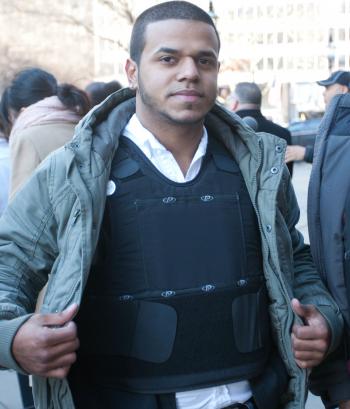NEW YORK—Fernando Mateo, president of the New York State Federation of Taxi Drivers (NYSFTD), spent this month fervently searching for ways to better protect the city’s cabbies.
Queens taxi driver, Trevor Bell, 53, was shot early December, prompting Mateo’s campaign to step up security measures. Bell was not killed, but remains in critical condition, reported Mateo on the steps of City Hall Monday morning.
A couple of weeks ago, Mateo received criticism for his call on drivers to racially profile their passengers.
On Monday, he announced a less controversial precaution—providing taxi drivers with bulletproof vests.
“This is just another layer of protection we want to provide the drivers with,” said Mateo.
Over the last decade, crimes committed against taxi drivers have dropped by 90 percent, said Mateo. Taxis have been equipped with greater safety features during this time: partitions, security cameras, and GPS tracking. In the early 1990s, around 40 taxi drivers were murdered per year and around 3,000 assaults occurred every month.
Though crime rates have dramatically dropped, drivers in some areas of the city still fear for their safety every time they get in their cars. The high-risk areas of Jamaica, Queens, and South Bronx will be the first to receive the vests. There are only 12 available now, donated by Security U.S.A. Inc., at a total cost of $6,000.
Safety doesn’t come cheap. Mateo is asking NYPD officers to donate their vests upon retirement. Private financial contributions are also welcome said Mateo. The NYSFTD will provide taxicab bases with vests that drivers can use while on duty and then leave at the base for the next driver on duty.
Chief operating officer of Security U.S.A. Inc, David Boehm, has been in law enforcement for over 20 years.
Queens taxi driver, Trevor Bell, 53, was shot early December, prompting Mateo’s campaign to step up security measures. Bell was not killed, but remains in critical condition, reported Mateo on the steps of City Hall Monday morning.
A couple of weeks ago, Mateo received criticism for his call on drivers to racially profile their passengers.
On Monday, he announced a less controversial precaution—providing taxi drivers with bulletproof vests.
“This is just another layer of protection we want to provide the drivers with,” said Mateo.
Over the last decade, crimes committed against taxi drivers have dropped by 90 percent, said Mateo. Taxis have been equipped with greater safety features during this time: partitions, security cameras, and GPS tracking. In the early 1990s, around 40 taxi drivers were murdered per year and around 3,000 assaults occurred every month.
Though crime rates have dramatically dropped, drivers in some areas of the city still fear for their safety every time they get in their cars. The high-risk areas of Jamaica, Queens, and South Bronx will be the first to receive the vests. There are only 12 available now, donated by Security U.S.A. Inc., at a total cost of $6,000.
Safety doesn’t come cheap. Mateo is asking NYPD officers to donate their vests upon retirement. Private financial contributions are also welcome said Mateo. The NYSFTD will provide taxicab bases with vests that drivers can use while on duty and then leave at the base for the next driver on duty.
Chief operating officer of Security U.S.A. Inc, David Boehm, has been in law enforcement for over 20 years.







